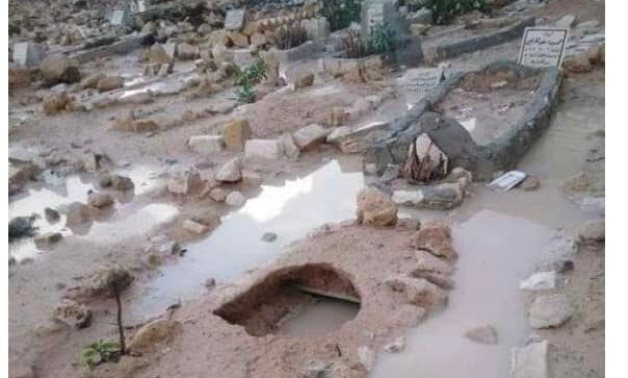
Rainwater inundates tombs in the Ghout Rabah cemetery, Marsa Matrouh- photo courtesy of "newspaper of Egyptians abroad
CAIRO - 3 October 2023: Egypt’s Ministry of Water Resources and Irrigation has been diligently at work over the past nine years, addressing the critical water challenges that stem from scarce resources and the negative implications of climatic variations.
Several major projects have been executed, especially in the realm of reusing agricultural drainage water, which aim to expand agricultural projects to achieve food security and counteract desertification. Notable among these projects are Bahr Al-Baqar, Al-Hamam, and Al-Mohsama, with Egypt recycling approximately 21 million cubic meters of water per day.
The subsequent report delves into crucial details regarding these groundbreaking initiatives:
1. The Guinness Record-Setting Water Treatment Plant:
The ministry has successfully completed the establishment of the Bahr Al-Baqar water drainage treatment station, which holds a spot in the Guinness World Records as the largest water treatment plant globally, processing 5.60 million cubic meters per day. The facility encompasses four units, each with a capacity of 1.40 million cubic meters per day.
2. Holistic Infrastructure Development:
Numerous operations were carried out within the framework of the project, such as earthworks and industrial activities to redirect the course of Bahr Al-Baqar drain. This involved the construction of three barrages, two lifting stations on the new Bahr Al-Baqar drain route, seven bridges, six tunnels, two reinforced concrete siphons, an emergency spillway, and 36 complementary works including turnouts, private drain outlets, subsidiary drain outlets, gates, and end-of-canal spillways.
3. Channeling Water to Reclamation Areas:
The implementation of the water transport routes project from the Bahr Al-Baqar water drainage treatment station to reclamation areas in north and central Sinai is ongoing. This comprises two pipeline routes spanning 105 kilometers and includes 18 pumping stations.
4. Conveying Agricultural Drainage Water to the West Delta:
Work is underway on the agricultural drainage water transport corridor project to the Al-Hamam water treatment station in the West Delta. It consists of 12 lifting stations and a carrier path extending 174 km, incorporating an open path of 92 km and a piped route of 22 km, in addition to rehabilitating existing watercourses for 60 kilometers.
It leads to the treatment station currently under construction, with a capacity of 7.50 million cubic meters per day, complemented by the refurbishment of 60 kilometers of existing water channels and the establishment of 15 lifting stations.
Egypt’s unwavering stride towards ensuring water and food security through innovative and large-scale water management projects demonstrates a resilient foresight in a future defined by climate change. The nation, through meticulously crafted endeavors like the Bahr Al-Baqar water treatment project and extensive water reuse infrastructure, charts a course that interweaves sustainability with technological ingenuity in the face of resource scarcity.
In the arid landscapes of Egypt, water, a scarce and valuable resource, has witnessed intense focus from the government, addressing challenges emerging from its limitation and adverse impacts of climate change. Spanning across 9 years, the Ministry of Water Resources and Irrigation has spearheaded significant endeavors, channelizing efforts towards combating water challenges and simultaneously fostering agricultural growth to ensure food security.
Comments
Leave a Comment